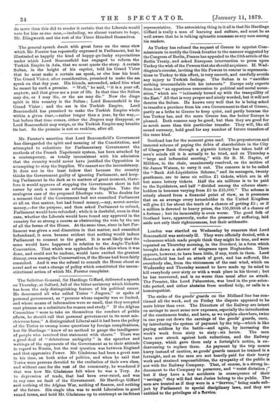Mr. Forster's assertion that Lord Beaconsfield's Government has disregarded the
spirit and meaning of the Constitution, and attempted to substitute for Parliamentary Government tha methods of the French Napoleonic system, has been attacked by a contemporary, as totally inconsistent with his admission that the country would never have justified the Opposition in attempting to stop the Supplies. We cannot see the inconsistency. It does not in the least follow that because the country thinks the Government guilty of ignoring Parliament, and keep- ing Parliament in the dark as to matters of great moment, there- fore it would approve of stopping the Government short in full career by such a course as refusing the Supplies. Take the analogous case of the proposed Rhodope vote. Who doubts for a moment that if the Government had not consulted Parliament at all on that matter, but had found money,—say, secret-service money,—for the purpose, and then asked Parliament to refund, Parliament would have refunded ; while it is doubtful, even in that case, whether the Liberals would have found any approval in the country for so strong a course as obstructing the vote by the use of all the forms of the House. At the same time, since in fact Par- liament was given a real discretion in that matter, and consulted beforehand, it soon became evident that nothing would induce Parliament to consent to the grant. It is most likely that the same would have happened in relation to the Anglo-Turkish Convention. That which was applauded to the skies when it was done, and could not be undone, would have excited the greatest dismay, even among the Conservatives, if the House had been fairly consulted. And it was the refusal to consult the House about so novel and so vast a change of policy which constituted the uncon- stitutional action of which Mr. Forster complains.






































 Previous page
Previous page